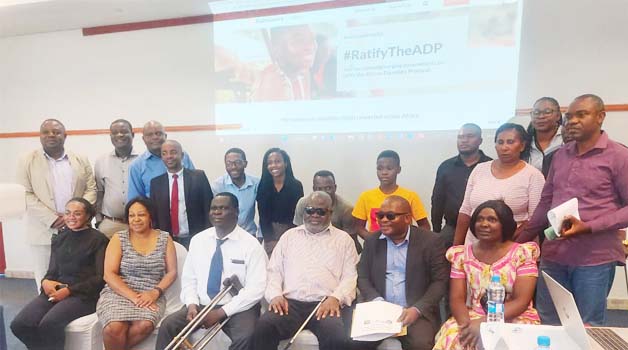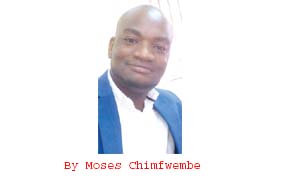FOR Patience Kanguma, having a society where people with disabilities are included in all sectors, and live together in acceptance without fear of discrimination, is a dream that is attainable.Ms Kanguma’s focus on disability rights comes from her close relatives and friends who live with a disability.
She has witnessed their challenges, especially the discrimination they face on a daily basis, and this motivates her to champion disability rights.
Similarly, Lucy Bwalya’s dream is to see parents and guardians embrace children with disabilities.
She believes that inclusion starts at home.
Her passion for disability rights stems from her experience in raising her nephew, who was born without disability but acquired cerebral palsy after suffering from severe yellow fever at the age six months.
Ms Bwalya says this stimulated her to further her studies in special education.
Both women work for Cheshire Homes Society of Zambia (CHSZ) in the Make Way programme, an intersectional approach to improve access to sexual and reproductive health and rights (SRHR) for vulnerable young people in Zambia, Ethiopia, Kenya, Rwanda, and Uganda.
The role of CHSZ in the Make Way project is to advocate for SRHR policies and programming, including the African Disability Protocol (ADP), and to establish safe spaces at health facilities for young people with disabilities.
Ms Kanguma, who is Make Way project manager at CHSZ, has implored the New Dawn government to prioritise signing and ratifying the African Disability Protocol (ADP) as Zambia strives to adhere to the principle of the Vision 2030 and sustainable development goals of leaving no one behind.
The ADP is tailored to the African context and upholds the rights of persons with disabilities from an African viewpoint.
It addresses unique and contextualised challenges and incorporates detailed issues such as customs, traditional beliefs, harmful practices and the role of the family, caregivers and community.
The protocol also deals with community-based rehabilitation and minority groups within the African disability community, including people with albinism.
However, since the ADP was adopted by all 55 member states of the African Union in Banjul in 2018, only Angola, Burundi, Kenya, Mali and Rwanda have ratified it while the rest of the countries are yet to do so.

“The Government of Zambia needs to maintain its position in the international community as a country that respects human rights and the dignity of its citizens including those of persons with disabilities. As Zambia adheres to the principle of leaving no one behind, it is essential that the
Government also signs and ratifies the African Disability Protocol,” Ms Kanguma explains.
As of now, attitudes towards people with disabilities in Zambia are negative; they face stigma and discrimination in their communities and their work places.
Many public and private infrastructures are not physically accessible, and information is not available in appropriate formats such as braille, large print or sign language interpretation which causes people with disabilities to miss out on important information.
For young persons with disabilities, the situation is particularly challenging as there is lack of inclusive schools, inaccessible recreational facilities, lack of access to SRH services and commodities, negative and judgmental attitudes from service providers, and stigma and discrimination from their families and communities.
Ms Kanguma also noted that Zambian laws and policies are not harmonised with the standards of the United Nations Convention on the Rights of Persons with Disabilities and the Persons with Disabilities Act.
She says, “Zambia is still using archaic laws that were being used in the colonial era and most Zambian policies and laws are not inclusive to persons with disabilities. Some are even discriminatory towards people with disabilities.”
“All operations and programming in the government are guided by policy. So, if the policies are negative and not inclusive of the minorities, it means the target populations will be left out.”
Ms Kanguma further explains that policy advocacy is the key to addressing exclusion at all levels in society.
Since September 2021, CHSZ, with technical support from the Netherlands-based Liliane Foundation, has been mobilising programme partners and organisations of persons with disabilities to develop a policy brief to justify the need to have the ADP signed and ratified.
With this policy brief as a basis, the organisation and partners have undertaken several advocacy efforts with government line ministries, mainstream and social media, and civil society organisations including organisations of (young) people with disabilities.
Ms Bwalya is the CHSZ communications officer and she explains how the consortium has been working with various media organisations in Zambia in this process.
“The media play a vital role in keeping everyone updated on various processes and advocacy efforts undertaken by CHSZ and partners. With help of the media, we raised awareness on the need to have the ADP signed and ratified by the Government of Zambia.”
“We informed stakeholders and the public about the importance of and our advocacy for the ADP. Media attention helped to further our cause, and to make the public aware.”
The regional advocacy campaign to ratify the ADP, launched in November 2022 by the African Union and Sightsavers, may provide an extra push to this extraordinary advocacy effort at national level.
Therefore, the two champions from CHSZ will undoubtedly remain in the forefront to raise their voice for the underprivileged in society.
For comments, email moseschimfwembe@gmail.com







